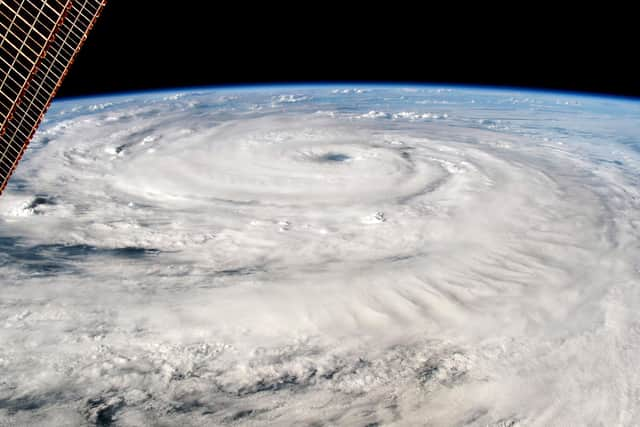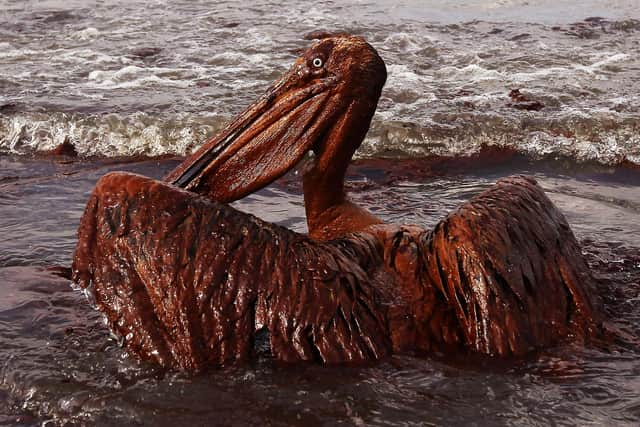COP26 climate change summit: Fossil fuel industry's 'doomist' propaganda cannot hide the reality of global warming – Professor Michael E Mann
This article contains affiliate links. We may earn a small commission on items purchased through this article, but that does not affect our editorial judgement.
Record-crushing heat waves and wildfires in North America, catastrophic floods in Europe, and another bruising Atlantic hurricane season reminded us of the grave cost of inaction.
More than two decades ago, I published the now-famous “hockey stick” graph. The “handle” of the hockey stick corresponds to the moderate temperature trend in the centuries that preceded the Industrial Revolution, going back 1,000 years. The “blade” is the abrupt warming trend of the past century, without precedent as far back as the data go.
Advertisement
Hide AdAdvertisement
Hide AdIn the latest United Nations’ climate report, the handle has been extended back another thousand years, showing modern warming to be unprecedented over an even longer timeframe. And the blade has gotten sharper, thanks to two decades of relative climate inaction.
The question now is: how bad are we willing to let the climate emergency get? We’ll get at least a partial answer at the climate talks in Glasgow. It will be a pivotal opportunity to demonstrate that we have the political willpower to take real action.
Our task is difficult, but not impossible. A recent UN report makes clear that nations, especially the biggest polluters such as the US, have to cut greenhouse gas emissions drastically this decade if we are to avert truly catastrophic planetary warming.
The Biden administration has made it clear the US is once again ready to lead on climate. And it’s already done a lot: rejoining the Paris Agreement, laying out plans to slash national emissions in half by 2030, and doubling climate finance commitments.


But, unfortunately, they’re running up against the limits of the politically possible. There’s only so much Biden can do without Congress. Anti-science Republicans and a coal-state Democratic senator are blocking bold plans to invest in low-carbon infrastructure and energy. And globally, oil, gas, and coal interests continue to argue for inaction, whether it’s in Cumbria or China.
So, how do we fight back?
First, we must not give into a sense of futility, the notion perpetuated by the fossil fuel industry and those doing its bidding that it’s too late to do anything about the problem. As I document in The New Climate War, the industry has worked for decades to instil doomism and despair, as well as doubt, denial, division and delay, all to protect its interests.
The good news is that early battles of our climate war have been won. It’s no longer credible for fossil fuel interests to deny climate change is happening. But they are turning to more insidious tactics, insisting for example that the needed clean-energy transition can’t possibly move fast enough without threatening reliable electricity and our economic system. Another form of doomism.


They have sought to blame clean energy for surging prices for gas, oil, and coal, and shortages. But fossil fuel prices are far more volatile than clean energy, which are now the cheapest source of new electricity in much of the world. Reversing course now in a desperate and misguided desire for cheap, dirty energy would be falling victim to fossil fuel industry doomism once again.
Advertisement
Hide AdAdvertisement
Hide AdGovernments must exert their agency. They have astonishing power, but too often are afraid to use it. The US, EU, and UK have set bold climate targets ahead of COP26. China’s pledge to stop funding new coal overseas was welcome, and signalled the beginning of the end for dirty coal energy. These actions are cause for cautious optimism, but we must, and can, do so much more.
The US needs to utilise the power of legislation and pass laws with meaningful clean energy provisions. Biden must meanwhile use his executive power to do everything else possible including implementing new fuel economy standards, regulating pollutants, protecting federal land, and safeguarding the American economy to create new manufacturing sectors and jobs.
The UK must resist the lure of oil and gas at home and support renewable energy deployment abroad. The EU has strong climate targets but must resist the short-term temptation to go back to oil, gas, and coal in a moment of crisis. Action to slow and eventually stop the build-out of coal in China must be next too – without it, we’ll miss our global climate targets.


No country can tackle the climate crisis alone. At COP26, industrial nations have an obligation to put money on the table to support poorer countries to grow their economies in a way that doesn’t threaten the health of the planet. The costs will not be small.
African climate negotiators have called for $1.3 trillion a year by 2030, BlackRock’s Larry Fink estimated we need $1 trillion annually invested in the developing world to combat climate change. Money spent on low-carbon development and resilience is not aid, it’s an investment in our collective future.
Finally, corporations and investors need to step up and lead or get out of the way. Companies have an opportunity to exert tremendous influence, but greenwashing must end. Pictures of smiling executives announcing long-term net-zero targets are meaningless if the same company is lobbying against climate action by governments. Investors must spend less money making the problem worse – since the Paris Agreement, the world’s 60 largest banks have invested $3.8 trillion in fossil fuels.
This is a critical juncture, where historical, political, and extreme weather events have conspired to wake us from our collective slumber. But rhetoric on climate must become reality.
And it won’t happen without sustained, unrelenting pressure from all of us on those resisting the needed systemic change. Presidents and executives have power and agency but, ultimately, so do we. It’s time to use it.
Advertisement
Hide AdAdvertisement
Hide AdMichael E Mann is distinguished professor of atmospheric science and director of the Earth System Science Center at Penn State University. He is author of the recent book, The New Climate War: The Fight to Take Back our Planet.
A message from the Editor:
Thank you for reading this article. We're more reliant on your support than ever as the shift in consumer habits brought about by coronavirus impacts our advertisers.
If you haven't already, please consider supporting our trusted, fact-checked journalism by taking out a digital subscription.
Comments
Want to join the conversation? Please or to comment on this article.
